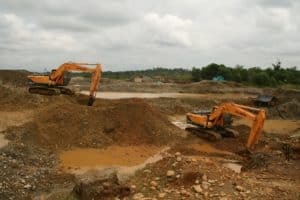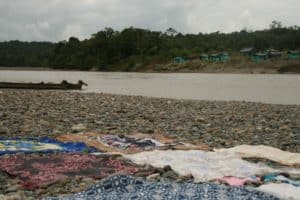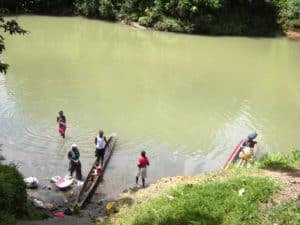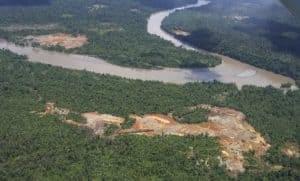The ecocentric ruling of the Constitutional Court is still in the process of implementation. 2023 was an important milestone as its implementation was incorporated into Colombia’s National Development Plan along with funding for its implementation.
In 2016 in a landmark ruling, the Colombian Constitutional Court adopted an unprecedented ecocentric approach to human rights: the judges recognised Colombia’s Atrato River as a legal entity with environmental rights that need to be protected alongside the communities’ bio-cultural rights. Thus, the Court acknowledged the inherent interdependency between the environment and communities in the Atrato region. This was the third ruling globally recognising the rights of rivers.
The Court ordered the Government to take a series of measures to protect the Atrato River and combat illegal mining in the region while taking account of “the environmental and social realities of the nation” [1]. The Court also reiterated once again the right to free, prior and informed consent for ethnic communities. This milestone judgment is major success for the protection of nature and the rights of communities.
Today, SIEMBRA is the legal representative and advisor to the Collegiate Body of the Guardians of the Atrato River in the implementation of the T-622 ruling of 2016 by the Constitutional Court, which declared the river a subject of rights. This ruling also protected the fundamental rights of the ethnic communities of the river basin, which were found to be violated by the State’s omission regarding the extractive economies present in the territory, ordering that the damages to the communities and the river be remedied from a biocultural perspective.
The legal issues
For several years, alerts by the afro-Colombian and Indigenous communities and their representatives concerning the urgency of the problems in the Atrato region have largely been met with indifference by the Colombian government. Today, however, the problems have culminated in an unprecedented environmental and humanitarian crisis due to the contamination of the river with toxic substances, erosion, accumulation of waste, deforestation and loss of biodiversity. This crisis has been further exacerbated by the realities of the armed conflict.

Against this background, Tierra Digna submitted evidence to the courts that informal mining activities had contributed to an exponential increase of the problems in the region, causing massive and systematic violations of the fundamental rights of the communities. For instance, at least 37 children have died after drinking poisoned water, and at least 64 children have suffered the consequences of poisoning. Moreover, diseases like diarrhoea, dengue and malaria have spread, especially among afro-descendent communities. [3]
In the absence of an adequate Government response to the dire humanitarian situation, Tierra Digna sought to get a legal decision stopping the use of heavy machinery and toxic chemicals for mining in the Atrato River, arguing that the informal mining activities did not only cause irreversible damage to the environment, but also to the human rights of the communities. The Government denied responsibility for the human rights violations.
The Constitutional Court’s decision
The Colombian Constitutional Court found that the state authorities were indeed responsible for violations of the right to life, health, water, food security, the right to a healthy environment, as well as the cultural and territorial rights of the claimant ethnic communities. The authorities had failed to comply with their constitutional obligation to take concrete and effective measures to stop the illegal mining activities, thereby causing a serious humanitarian and environmental crisis in the river basin of the Atrato River, its tributaries and the surrounding territories.
a. The Right to life, water and food
The Constitutional Court was satisfied that informal mining activities around the Atrato River had gravely contaminated and threatened water sources and forests.
It stated that “whereas water is not explicitly listed as a right as such in the Constitution, the Constitutional Court does consider it as a fundamental right, because it forms part of the essential core of the right to live in dignity. This is so not only where water is designated for human consumption, but water must be considered as essential part of the environment and is vital for the life of multiple species in the world.” [4] This means that natural water resources must be protected to ensure the preservation of ecosystems that form the basis for an adequate standard of living. In an unprecedented interpretation of constitutional law, the Court went as far as pronouncing the Atrato River itself as legal subject with specific rights regarding its protection, conservation, maintenance and rehabilitation.
Regarding the right to food, the Court determined that the contamination of the river had threatened ethnic communities’ access to food and forced them to give up their traditional ways of producing food. Instead, the mining activities had imposed a model of development on the communities which is incompatible with their ancestral practices, thereby eroding social structures and traditions.

In accordance with the precautionary principle (i.e. Principle 15 of the 1992 Rio Declaration), the Court stated that whenever the harmful effects of an activity are uncertain, authorities have the duty to opt for a solution that prevents possible harm. In other words, the Government is legally obliged to take measures to anticipate and prevent damage to communities, or – if the harm has already occurred – it must adopt compensatory measures.
This being said, the Court concluded that the government was liable for the violation of the rights of the communities to food security and water. The Court also criticised that government authorities had not coordinated their actions to address the problems: The Ministry of the Environment and the Ministry of Agriculture had both separately implemented some agricultural programmes, but failed to coordinate a joint and effective policy.
The Court then ordered a prohibition of the use of toxic chemicals, such as mercury, in any legal and illegal extractive activities in the future.
b. Cultural and territorial rights
The Court acknowledged that mining activities have had a strong impact on ethnic communities and their territories, generating displacement, elevated school drop-out rates, high levels of violence and prostitution and an erosion of traditional forms of subsistence, including artisanal mining. This has affected communities’ right to physical, cultural and spiritual survival.
Notably, the Court highlighted that in the absence of sufficient state control, this is a threat posed not only by informal and illegal mining, but also by licensed or “legal” mining activities. In this context, the Court reiterated the transcendent nature of communities’ right to informed and prior consultation before legal extractive projects can be developed – not only in Chocó.
c. New paradigm: biocultural rights
Based on an extensive analysis of international law [5], the Court introduced the concept of biocultural rights into Colombian constitutional law, thereby recognising the direct interdependency between nature, natural resources and the cultures of ethnic communities and Indigenous Peoples. The Court emphasised that an ecocentric approach to human rights acknowledges that preserving biodiversity is intrinsically linked with the preservation and protection of different forms of human life and cultures.
In summary, biocultural rights are the precondition for the rights of ethnic and Indigenous communities to exercise territorial autonomy in accordance with their own laws and customs. This includes the right of communities to administer the natural resources in the territories in which they have developed their culture, traditions and their special relationship with the environment and biodiversity.

Court orders
In summary, the Court ordered the Government to implement the following measures without delay:
- Develop a plan to clean up the water sources of Chocó, starting with the Atrato river, rehabilitate its ecosystems and prevent further harm.
- Draw up a joint action plan to stop illegal mining in the Atrato and its tributaries. Confiscate heavy machinery and prohibit the use of toxic substances in the Atrato River.
- Adopt a comprehensive action plan to recover traditional forms of subsistence and food production, taking account of the specific needs of ethnic communities and their right to food security.
- Conduct a toxicological and epidemiological study to determine the degree of contamination of the Atrato River and the effects on the health of the communities.
- Establish a “Commission to safeguard the River Atrato”, which should be composed of members of the various ethnic communities, the government and experts.
- Develop a plan to strengthen regional institutions and enhance their capacity to tackle all forms of illegal mining (i.e. provide sufficient financial resources, institutional capacity and staff).
- Make sure that all legal mining projects strictly comply with the obligation of conducting a prior consultation with communities that could potentially be affected by the planned activity.
- Regulate the gold trade to end impunity for corporate actors that have been directly or indirectly funding illegal armed groups, drug trafficking, organised crime or illegal gold mining.
ABColombia further recommends
- That all the recommendations, and plans that have been devised for the rulings should be consulted with, and implemented together with the Guardians of the Atrato
- The Guardians have a range of Projects that would work with nature to protect the river and its biodiversity alongside providing a sustainable economic basis for the communities, ABColombia recommends that the funding is put into these projects.
Background
The Atrato River, which originates in the Western Andes and flows into the Caribbean, is 750 km long and the biggest fresh water source in Colombia. The main river basin and its tributaries provide water to the Chocó region, which is one of the most biodiverse regions in the world.
The river banks of the Atrato are part of the ancestral territories of several Afro-Colombian and Indigenous communities, whose subsistence depends on the river. The ancestral way of life of those communities is shaped by the ecosystem of the river, where they have traditionally practised artisanal mining, traditional agriculture, hunting and fishing for many generations.
However, as a consequence of the proliferation of informal gold mining in the region, the Atrato River and its tributaries are also among the most contaminated in Colombia. The intensive and large-scale extractive activities and the use of mercury for gold mining have damaged the environment. This has had serious repercussions for the ethnic communities and the natural equilibrium of the ecosystem they live in.

References:
[1] See paragraph 9.45 of the judgment.
[2] The Research Centre for Social Justice, “Siembra” is a Colombian NGO and a partner of ABColombia members SIEMBRA is an organisation that accompanies grass-roots community organisations – Indigenous, Afro-Colombian and peasant – in defence of their rights, land and community processes against the advance of extractives. The extractive economy in Colombia has generate disproportionate impacts on nature and on the effective enjoyment of rights of the communities in whose territories they are implemented. It is a model of dispossession that has created situations of injustice, led to the violation of rights, has deepened inequality and has originated a multiplicity of socio-environmental conflicts in Colombia.
[3] These facts had been confirmed by the Colombian ombudsman. Cf. Defensoría Delegada para los Derechos Colectivos y del Ambiente: “Minería de hecho en Colombia” (2010); Defensoría del Pueblo, “Crítica situación de derechos humanos en Chocó por impacto de la minería ilegal y enfrentamientos entre grupos criminales” (2014).
[4] “Si bien el derecho al agua no está previsto en la Constitución como un derecho fundamental, la Corte Constitucional sí lo considera como tal por cuanto hace parte del núcleo esencial del derecho a la vida en condiciones dignas no sólo cuando está destinada al consumo humano, sino en tanto es parte esencial del medio ambiente y resulta necesaria para la vida de los múltiples organismos y especies que habitan el planeta.”
[5] The Court consulted a number of international treaties and declarations, including the ILO Convention 169 concerning Indigenous and Tribal Peoples in Independent Countries; 1992 Convention on Biological Diversity; 2007 UN Declaration on the Rights of Indigenous Peoples; 2016 OAS American Declaration on the Rights of Indigenous Peoples; 2003 UNESCO Convention for Safeguarding Intangible Cultural Heritage.
[6] The legal case was brought by the Consejo Comunitario Mayor de la Organizacion Popular Campesina del Alto Atrato (Cocomopoca), el Consejo Comunitario Mayor de la Asociación Campesina Integral del Atrato (Cocomacia), la Asociación de Consejos Comunitarios del Bajo Atrato (Asocoba), the Inter-ethnic Solidarity Forum of Chocó (Foro Inter-étnico Solidaridad Chocó – FISCH) and others against the President and others.
[7] Defendants included: the Ministry of the Interior, the Ministry of the Environment and Sustainable Development, the Ministry of Mining and Energy, the Ministry of Defence, the Ministry of Health and Social Protection, the Ministry of Agriculture, the Ministry of Housing, Cities and Territory, the Ministry of Education, the Department of Social Prosperity, the National Planning Department, the National Mining Agency, the National Agency for Environmental Licenses, the National Health Institute, the Departments of Chocó and Antioquia, Codechocó (Autonomous Regional Agency for Sustainable Development in Chocó), the Sustainable Development Agency of Urabá (Corpourabá), the National Police Unit against Illegal Mining, the National Ombudsman, the Comptroller General, the Inspector General, various municipalities and others.
